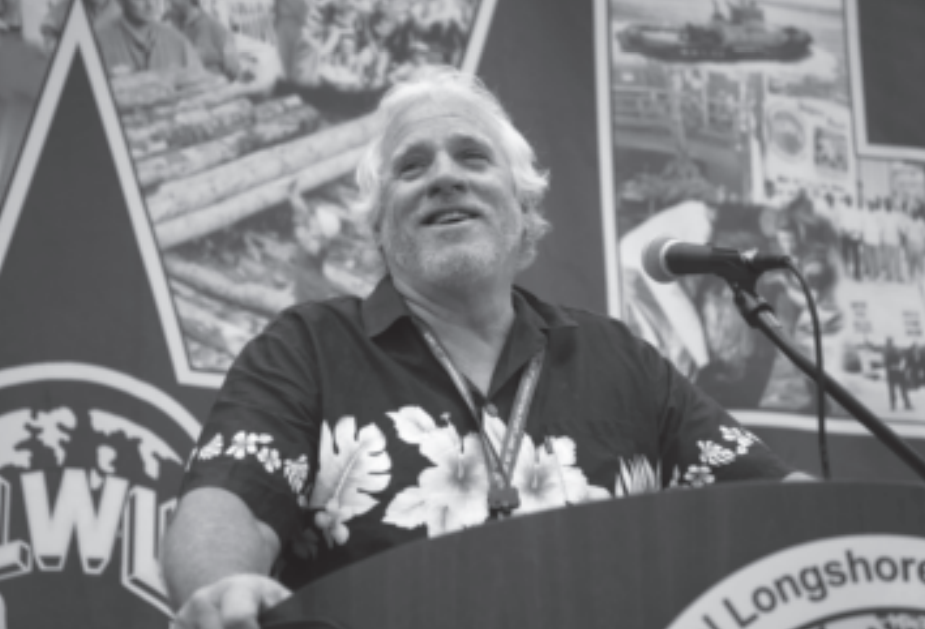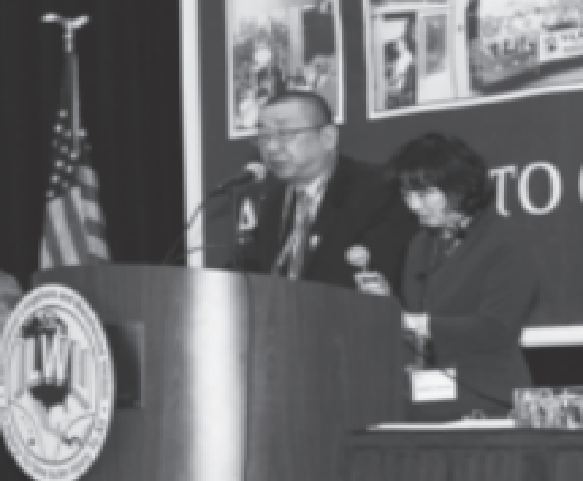on the convention floor, proposed resolutions had to first win support from a majority of local union members at home, or a majority of local union delegates attending the convention. Then each resolution was thoroughly explained, debated, amended and subject to a vote in one of the committees before finally reaching the convention floor where it faced further debate and a final vote by the delegates. In order to consider all of the proposed resolutions, some committees met late into the night in order to finish their work.
International guests
Beginning on the second day, delegates began hearing from international trade union leaders, beginning with Paddy Crumlin, National Secretary for the Maritime Union of Australia (MUA) and President of the International Transport Workers Federation (ITF). Crumlin is known for his fiery and inspiring speeches and he did not disappoint. He began by recognizing the native tribes of the Portland area including the Multnomah, Klamath, and Clackamas peoples.
He then paid tribute to the host city, praising Portland for its wonderful public transportation system, abundant parks and social policies – and for being one of the most progressive and democratic cities in the country. “This is our achievement, the working class,” Crumlin said. “Nobody gave us those things.”
Crumlin emphasized the importance of working class organizations, including unions, that that have fought for generations to advance the interests of workers and defended those gains from constant assaults by employers.
“The challenge for trade unionism is far greater than it’s ever been. Longshoremen in Australia and here have good conditions of employment but no one gave them to us. We fought every day and every inch and we are still fighting. We are born out of struggle and we will continue to be in that vortex of struggle. Why? Because we are strong. We are powerful. We have high self-esteem. We have genuine democracy. We are working people that build our lives around each other. We reconcile our differences in our collective interest. That is what they fear.”
Crumlin then went on to argue for the importance of international solidarity. He spoke about the revitalization of the ITF after the Liverpool dockworkers strike 20 years ago. He argued that the survival of dockworker unions is essential for helping all workers around the world.
“How can you protect Filipino seafarers, nurses, and teachers if you can’t protect dockworkers? We are right in the center of international trade. We’ve got history and form. We’ve got unity and militancy. If they destroy us, what chance does the international working class have? Absolutely none.”
Crumlin challenged the labor movement with a vision that was not merely defensive.
“We are going to change this world for the many, not just the few. No one is going to do it but us. No one has got that self-belief. No one has got the institutions. Our political institutions have failed us. So we are going back to the institutions that we formed to protect ourselves against greed and exploitation wherever it stood up,” Crumlin concluded.
Joe Fleetwood
After Crumlin, the convention heard from General Secretary of the Maritime Union of New Zealand (MUNZ) Joe Fleetwood. He talked about the long history of solidarity between MUNZ and the ILWU, noting that Harry Bridges used to attend their conventions in New Zealand. “Unity, solidarity and internationalism aren’t just words,” Fleetwood said, “they’re the way we live.”
Fleetwood thanked President McEllrath for the support they received from the ILWU during their dispute with the Ports of Auckland.
Steve Cotton
Steve Cotton is the General Secretary, who holds the top staff position at the International Transport Workers Federation. He said it was an honor to speak before the ILWU delegates and praised the uniqueness of the ILWU in the North American labor movement, noting the ILWU’s strength and power that established a global standard for dockworkers wages and working conditions.
Working men and women need inspiration from trade unionists now more than ever, said Cotton. “Unions are vilified by those in power because we are the last bastion of democracy.” He praised the internationalism of President McEllrath, adding, “There are no soft fixes with Bob,” Cotton said. “He does things in a way that is democratic and accountable.”
Chris Cain
On the third day of the convention, MUA’s Western Australia Branch Secretary addressed delegates and detailed the attacks by employers on Australian docks, mines and petrochemical industries.
He spoke about the need to challenge unjust laws in Australia that prevent workers from effectively resisting employer attacks. “Unions need to be industrially strong, politically strong, and financially strong,” he said.
Cain said that unions like the ILWU and MUA should maintain their militant and democratic traditions and history of cooperation between the two unions. “A strong ILWU means a strong MUA,” Cain said. “We need to organize, organize, and then organize again.”
Niek Stam
The National Secretary of the Dutch Dockers Union (FNV), Niek Stam, spoke about the many challenges facing workers in the shipping industry - especially consolidation and automation of terminals
“The next chapter will be challenging due to new developments in our industry,” he said. “The ILWU must come together with other unions in the ITF. New challenges are coming about that will influence the future of the longshoremen we represent,” said Stam.

Paddy Crumlin: National Secretary for the Maritime Union of Australia (MUA) and President of the International Transport Workers Federation (ITF), Paddy Crumlin, celebrated the importance of unions that have fought for generations to advance the interests of workers and have defended the gains that have been made from constant assaults by employers. Crumlin said that the powerful economic interests attack unions because they fear our strength and genuine democracy.

Katsushige Mashima (photo by Lewis Wright).
Katsushige Mashima
On the fourth day of the convention, Katsushige Mashima, President of Zenkowan, the All Japan Dockworkers’ Union, addressed delegates. He traced his personal relationship with the ILWU back to 2012 when ILWU members in Hawaii were fighting for a first contract at the Pacific Beach Hotel in Honolulu. Zenkowan helped win the fight by enabling the hotel workers to reach Japanese travel agents and ultimately, Japanese tourists who frequently vacation in Hawaii.
Mashima described the challenges now facing Japanese dockworkers: “Our port industries are at a crossroads, with automation that will affect workers. We must make sure that workers are secure and that rights and safety are maintained,” Mashima said. The ILWU and Zenkowan renewed their “Friendship and Solidarity Agreement.” This important gesture has become a tradition at recent ILWU conventions. The latest solidarity agreement was signed by President Mashima and the four Titled Officers of the ILWU.
Steve Todd
Following Mashima was Steve Todd, National Secretary of Britain’s Rail, Maritime & Transport Workers’ Union (RMT). “I am here because of the international solidarity that has brought us together over the years, and I want to express that solidarity to all you brothers and sisters at the convention,” declared Todd. He spoke about the importance of international solidarity and recognized the ILWU’s history of being at the forefront of international struggles. He said the ILWU has always been one of the first unions to step forward and help workers in need of assistance around the world. Todd talked about the declining number
